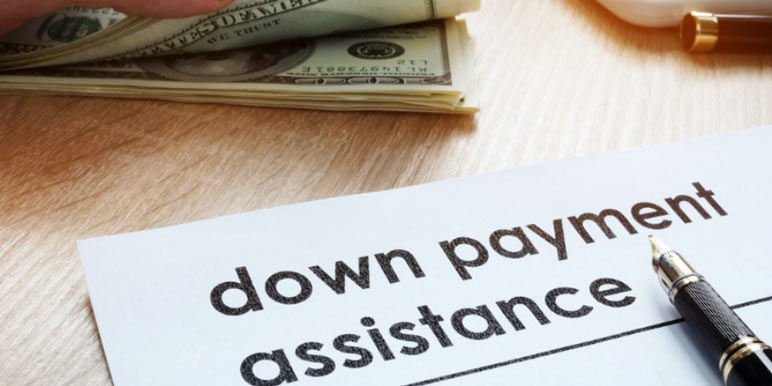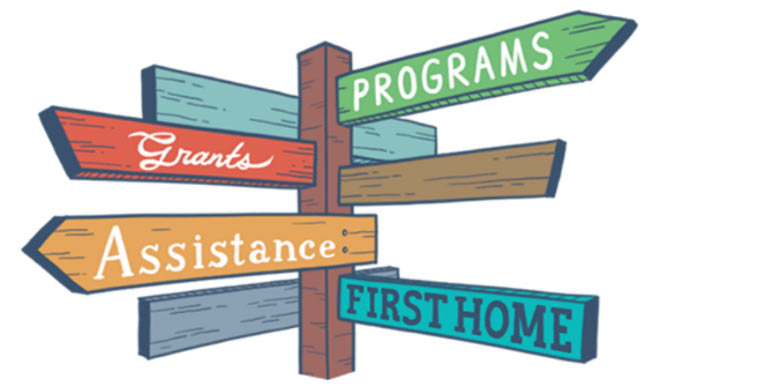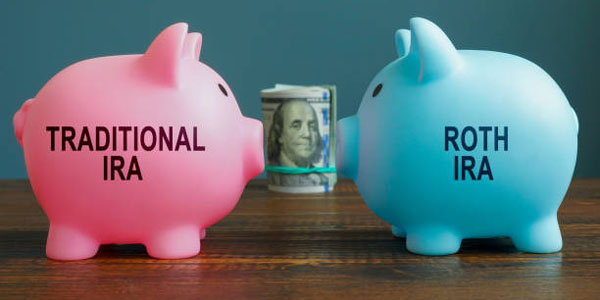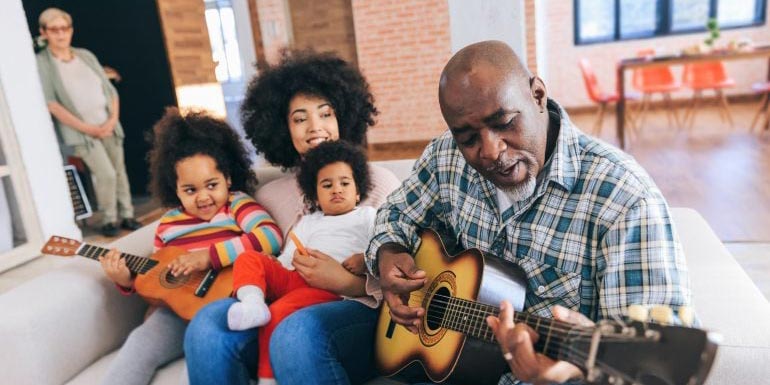Are you a first-time homebuyer struggling to find enough money for a down payment? You might be surprised that down payment assistance is available for those needing financial help.
Down payment assistance can make the dream of owning your home much more attainable by providing funds to cover the initial costs of buying or refinancing a property.
In this blog post we'll explore what down payment assistance is and how it can benefit potential homeowners.
What is Down Payment Assistance

Down payment assistance (DPA) is a loan or grant that helps first-time homebuyers with the initial costs of purchasing or refinancing a property. DPA can come from federal state, local, or private sources and may be grants no-interest loans, deferred payments, reduced mortgage interest rates, and other forms of assistance.
For example, the U.S. Department of Agriculture and Housing and Urban Development offers down payment assistance programs designed specifically for first-time homebuyers.
Private organizations also provide DPA, such as nonprofits that provide grants or low-interest loans. Additionally, some lenders may offer unique DPA programs to help buyers with their down payments.
DPA can be a great tool for those struggling to find enough money for a down payment. By having assistance available, potential homeowners can take the first step towards making their dream of owning a home a reality.
How Does Down Payment Assistance Work

The funds provided by down payment assistance programs can be used for closing costs, appraisal fees, prepaid taxes and insurance costs, home inspections, and other expenses associated with purchasing a property. It's important to note that the money available through down payment assistance programs varies from state to state.
Who Qualifies for Down Payment Assistance
Here are some common factors that often determine eligibility:
Income Limits
Many DPA programs have income limits to ensure that assistance is targeted toward individuals and families who need it the most. These limits may vary based on household size and the area's median income. The income limits are usually set as a percentage of the median income for the specific location.
First-Time Homebuyers
Some DPA programs specifically target first-time homebuyers. These programs aim to assist individuals who have yet to own a home in a specified period, typically within the past three years. However, not all DPA programs have this requirement, and some may also consider applicants who have previously owned a home under certain circumstances.
Credit Score
While credit score requirements vary, DPA programs often consider creditworthiness as part of the eligibility criteria. The minimum credit score required may vary between programs, and some programs may assist individuals with lower credit scores by offering additional counseling or support.
Homeownership Education
Many DPA programs require applicants to complete homebuyer education courses. These courses provide information and guidance on the home buying process, financial management, and responsible homeownership. Completion of these courses may be mandatory to qualify for assistance.
Property Requirements
Some DPA programs may have specific property requirements. For example, they may limit assistance to properties within certain geographical areas or have price caps on the homes that qualify for the program. Understanding any property-related restrictions imposed by the DPA program you're considering is important.
It's worth noting that DPA programs are typically designed to assist individuals or families with moderate or lower incomes. However, availability, eligibility criteria, and specific requirements can vary significantly based on the program and the organization assisting.
It's advisable to research programs in your area and directly contact the program administrators for detailed information.
5 Types of Down Payment Assistance
Cash Grants for Your Down Payment
These programs provide a direct cash grant that can be used towards your down payment. The grant does not need to be repaid; it helps reduce the money you need to bring when purchasing a home.
Closing Costs Credits
Some down payment assistance programs offer credits that can be applied toward closing costs. Closing costs typically include fees related to the loan, title search, appraisal, and other expenses associated with the home purchase. These credits help offset those costs, making it more affordable to complete the transaction.
Interest Rate Reductions
Certain down payment assistance programs provide interest rate reductions on your mortgage loan. This reduction means that the interest rate you pay on your loan is lowered, resulting in lower monthly mortgage payments. This reduction can make homeownership more affordable in the long run.
Property Tax Bill Credits
Down payment assistance programs sometimes offer credits or reductions on your property tax bill. This assistance helps lower your overall homeownership expenses and can make it more manageable to meet your financial obligations.
Down Payment Loans
Instead of providing a grant, some DPA programs offer loans to assist with the down payment. These loans often have favorable terms, such as low or zero interest rates. They are typically repaid over a specific period, allowing you to spread out the repayment of the down payment amount.
How Much Money Do You Need For a Down Payment?
The amount of money you need for a down payment when purchasing a home can vary depending on several factors. Here are some general guidelines:
- Percentage of the Home Price: Traditionally, down payments are expressed as a percentage of the home's purchase price. The most common down payment percentages are 20%, 10%, and 5%. For example, if you're buying a home for $300,000, a 20% down payment would amount to $60,000.
- Conventional Loans: Conventional mortgage loans typically require a down payment of at least 5% to 20% of the home's purchase price. However, some lenders may offer conventional loans with down payments as low as 3%, especially for first-time homebuyers. It's important to note that putting less than 20% down on a conventional loan may require private mortgage insurance (PMI) to be added to your monthly mortgage payments.
- FHA Loans: The Federal Housing Administration's (FHA) loans are frequently available with reduced down payments. You can be eligible for a down payment of just 3.5% of the home's cost with an FHA financing. However, mortgage insurance premiums (MIP) are another expense associated with FHA loans.
- V.A. Loans and USDA Loans: If you're eligible for a loan guaranteed by the U.S. Department of Veterans Affairs (V.A.) or the U.S. Department of Agriculture (USDA), you can purchase a home with no down payment. These programs are designed to assist specific groups, such as military veterans (V.A. loans) or individuals in rural areas (USDA loans).
How to Find Down Payment Assistance to Buy Your Home
Finding down payment assistance to buy your home requires proactive research and exploring available resources. Start by contacting local housing agencies, non-profit organizations, and government programs that offer down payment assistance in your area.
Online resources and search engines can also provide information on relevant programs. Attend homebuyer education courses to learn about assistance options. Consult with lenders specializing in down payment assistance programs to understand eligibility and requirements.
Additionally, consider exploring employer-sponsored programs, community grants, and regional initiatives. Thoroughly researching and leveraging these resources will increase your chances of finding the down payment assistance you need to make homeownership more attainable.
FAQs
Is Down Payment Assistance a Loan?
No, down payment assistance is not a loan. It is a grant or gift of money from either the federal government, state government, or another organization to help cover the cost of your down payment and closing costs.
What is the biggest negative when using down payment assistance?
The biggest downside to using down payment assistance is that it may come with additional requirements, such as taking a home buyer education class or attending credit counseling.
What credit score is needed to buy a house with no money down?
The minimum credit score required to buy a house with no money down depends on the loan type you seek. For example, you may need a minimum FICO® Score of 620 for an FHA (Federal Housing Administration) loan, while other programs may require higher scores or alternative credit scores such as VantageScore 3.0.
Conclusion
Down payment assistance is a great way to help bridge the gap between what you can afford and the cost of buying a home. These programs support those who may not otherwise be able to make it to their closing date. You don't necessarily need the large amounts of money typically associated with a down payment, as several options are available for qualified buyers that enable them to receive much-needed funds.



